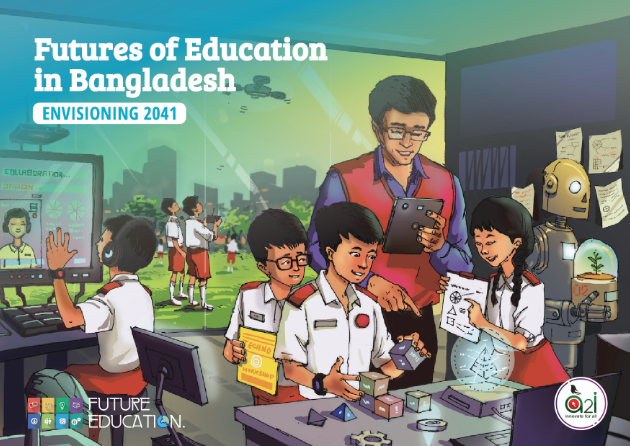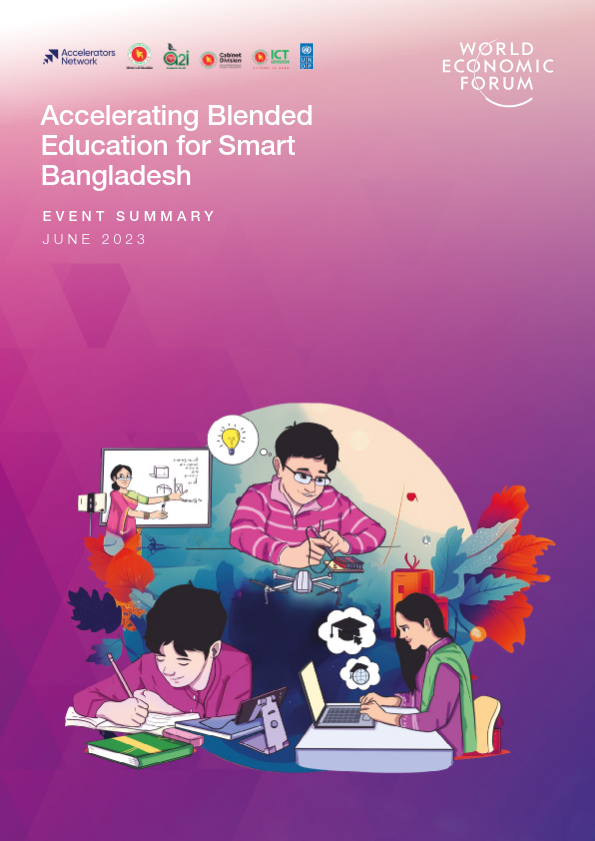Our Initiatives
What is it?
21st-century skills require a 21st-century education system. The traditional education system is obsolete in the new normal catalyzed by COVID-19. Blended education has thus been an integral strategy in Bangladesh’s journey towards achieving quality education, skills and human-resource development in the new normal.
The Blended Education Accelerator (BEA) is a national public-private collaboration platform that brings stakeholders from across primary and secondary education in Bangladesh together to prepare the next generation of talent for the future of work.
BEA focuses on 3 major areas. It:
CONNECTS
Creates a ‘phygital’ space to facilitate direct interaction among users of blended education – students, teachers, parents, administrators, and policymakers.
EXPLORES
Links to a global network of learning and mutual exchange featuring leading experts and learning partners.
INNOVATES
Cultivates the spirit of a human-centered design approach across the blended education ecosystem through deep engagement and understanding of the experiences of users.
Provides resources and support to innovators for rapid scale-up of inclusive blended education solutions.
Implements new data and measurement mechanisms for Education 4.0
While acting locally, BEA is committed to thinking globally through its participation as a member of the World Economic Forum’s Closing the Education Gap Accelerators global learning network.
It also strengthens the Annual International Blended Education Summit, organized by the Government of Bangladesh – a flagship event that connects educational forums from around the world.
5 Key Focus Areas
Under the visionary leadership of Honourable Prime Minister Sheikh Hasina, Digital Bangladesh has created the foundation for an Inclusive Blended Education Ecosystem. It brings together public-private sectors and combines high-, low- and no-tech resources to enable learners from varying socio-economic backgrounds to have greater control over where they learn, when they learn and how they learn, thus ensuring personalised education for all.
Covid-19 presents an innovation dividend in terms of generating mass awareness, acceptance and scaling digital services to ensure no one is left behind. It also accelerated the development of a comprehensive National Blended Education Master Plan, 2022-2031 by the multi-ministerial National Taskforce for Blended Education chaired by Honourable Minister of Education
The master plan is based on Blended Education For All (BEFA) Framework, Made in Bangladesh, this framework is based on the 13 years long journey of digital transformation by the Ministry of Education, Ministry of Primary and Mass Education and a2i Programme of the ICT Division and , Cabinet Division with technical support from and UNDP Bangladesh.
BEA’s Key National Public and Private Actors
Key Activities
BEA is sparking innovation across the primary and secondary sub-sectors, by (i) conducting situational analyses, (ii) documenting best practices, (iii) evaluating impact, (iv) developing guidelines, systems and capacity and finally (v) organizing flagship regional summits.
BEA will also play a key role in driving technology adoption (infrastructure, pedagogy and education content & resources), implementing new measurement mechanisms (assessments), empowering educators (teachers’ professional development), mobilize investment in education (financial innovation) and nurture data-driven planning and decision-making (evidence).
BEA’s engagement with WEF’s Closing the Education Gap Accelerators will not only strengthen the blended education ecosystem in Bangladesh through crowd-sourcing insights both locally and globally, but also enable Bangladesh to engage more deeply in other relevant educational forums around the world. It is hoped that BEA will play a pivotal role in transforming primary and secondary education systems and prepare the next generation of learners for an innovative Bangladesh.
In the Edtech revolution of Bangladesh, the online adolescent portal called Konnect, launched in 2018, is another milestone. Konnect is a shortened term for ‘Kishore Connect’. Kishore means teenage in Bangla. It’s a multi-sectoral effort with government, NGOs, private sector companies, all contributing with resources and content.
Bangladesh is home to more than 36 million adolescents and youths. Guiding them towards a healthy and prosperous future requires a collective effort from both the society and the government. Konnect was developed by a2i and Shahjalal Science and Technology University (SUST) for the youth, to offer a healthy online social platform alternative that promotes their creativity and nurtures their talents.
The platform connects adolescents especially aged between 10 to 24 through both online and offline activities among themselves and also with various local and national NGOs and development partners. It also provides various online edutainment materials including online classes on photography, painting, life skills, mental health, etc. Teenage users can share, upload and learn from creative multimedia content and important life lessons that can help develop their talent, social and personal skills.
3 million+
students connected
35800+
content available
E-learning platforms are not something new, as we have already seen hundreds operating successfully in the world. However, a government-owned platform that is also for every citizen is undoubtedly remarkable, especially for a country like Bangladesh.
Launched in 2016, MuktoPaath brings skill-based professional and academic courses at affordable costs to every citizen’s doorstep. It has varied courses for teachers, students, professionals, lawyers, healthcare professionals, migrant workers, and more. With 208+ courses available on the platform, both online and offline, MuktoPaath has helped enhance knowledge and skills of millions, including the poor and underserved. Completing a course also entitles the participant to a government recognised certificate from the platform.
One of the recent strides of the platform has been to train more than 300,000 Doctor & healthcare professionals on how to tackle the COVID-19 pandemic. During the pandemic, the platform was also utilized to train judges, lawyers and court-room professionals on how to conduct virtual hearings and more.
1.19
Million
Registered Members
1.98
Million
Enrolled Learners
1
Million
Graduate Learners
208+
courses
Offered
100+
Collaboration
Government and Non-Government Organizations
For decades, Government schools have been predominantly following the traditional blackboard-chalk-lecture method.
The Multimedia Classroom (MMC) initiative was amongst the first milestones towards a digital Bangladesh, inspiring the initial steps of EdTech in the country. Launched in 2012, the MMC paved the way for integrating multimedia learning aids in the classroom, introducing innovative and advanced teaching pedagogies nationwide. The initiative started its journey with just over a thousand schools during its pilot period and currently more than 45,000 schools are using MMCs.
MMCs encompass one projector, one laptop, a set of speakers, and an internet data package. The main objective of the MMC initiative is to ensure making learning more interesting and up-to-date, using audio-visual content.
45,000+
schools have multimedia classrooms
7.5 Million+
Students
50,000+
MMCs are in the pipeline
When COVID forced all schools to close indefinitely putting the future of an entire generation at risk, the government started making every effort to minimize the learning loss.
Given that only about 35% secondary school students and less than 20% primary school students have access to the internet, TV was conceptualized as an effective education content delivery mechanism. An idea that was put forward several years ago based on the largely underutilized infrastructure of Parliament TV with the Hon’ble Prime Minister, Hon’ble Speaker of the Parliament, and the Hon’ble Education Minister all endorsing the idea.
The urgency and sheer weight of the massive need created by COVID-19 finally enabled the Parliament TV to be repurposed so it could broadcast thousands of lessons – 19 classes daily, from morning to early evening – for primary, secondary, madrassa, and vocational education, this time reaching students in tens of millions.
And thus, Parliament TV, once a TV station that was largely under-utilized by airing parliament sessions every few months, transformed into delivering thousands of daily lessons — a transformation that took just 6 days.
The journey of Teacher’s Portal started with 23 teachers who asked a simple question – “Who should make the content for teaching the students?” They went on to create a social media platform and start sharing teaching content prepared by them with fellow educators. Their philosophy was that teaching content should be customized to each classroom and created by teachers themselves, instead of consultants and companies.
That innocuous portal, started by 23 teachers in 2011, has now grown into a popular, full-fledged social media site and is now the largest online educational content storage and professional development platform in Bangladesh, boasting more than 575,000 teachers as active members. Teacher’s Portal works as a peer-to-peer capacity development hub for teachers where they can collaborate to create more quality educational content that meets the specific needs of the pupils in their classrooms. It also embodies recognition for the teachers and motivates them via intrinsic and extrinsic means.
The transformation of digital education in Bangladesh has really been teacher-led, teacher-driven and learner-focused. The Teacher’s Portal is playing a crucial role in this transformation journey.
590,000+
teachers reached
585,000+
teaching content materials
17,000
daily average users
2800+
ICT4E ambassador teachers
900,000+
Teachers Aim





















